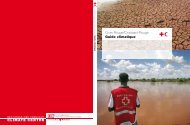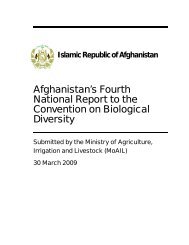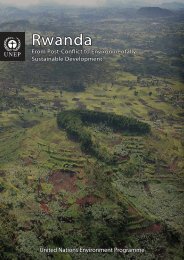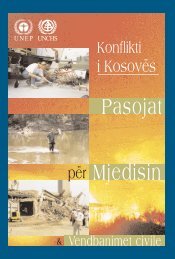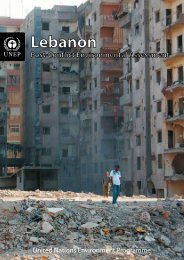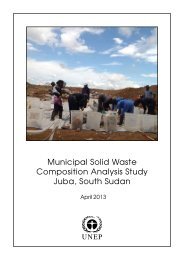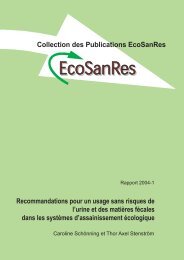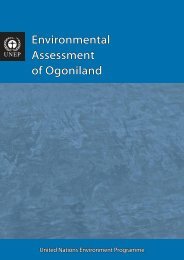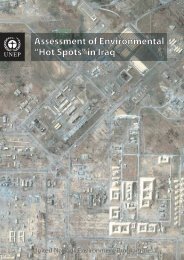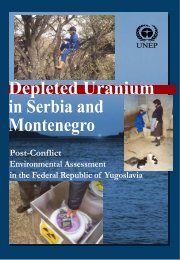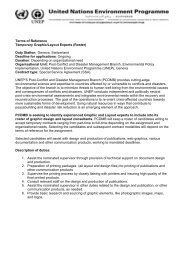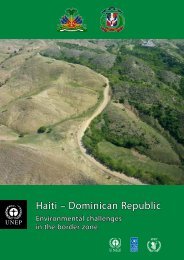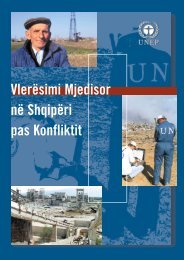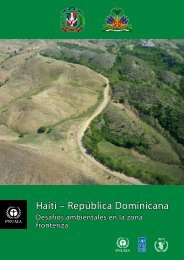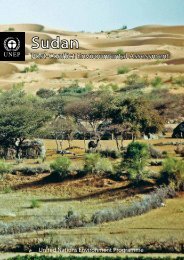Strengthening capacity - Disasters and Conflicts - UNEP
Strengthening capacity - Disasters and Conflicts - UNEP
Strengthening capacity - Disasters and Conflicts - UNEP
Create successful ePaper yourself
Turn your PDF publications into a flip-book with our unique Google optimized e-Paper software.
acknowledged <strong>and</strong> respected by higher levels of<br />
government Do those presiding over these issues,<br />
from local arbiters to judges in the capital, have the<br />
relevant knowledge base to render fair decisions<br />
Does their <strong>capacity</strong> need to be strengthened<br />
Oversight: Can citizens appeal governmental<br />
decisions to courts or adjudicatory bodies Is<br />
there a need for an ombudsman or civil society<br />
advocates to represent individuals who object to<br />
government action Is there a role for national<br />
human rights commissions, especially those<br />
who have quasi-judicial powers How strong<br />
is the legislative branch’s oversight <strong>capacity</strong><br />
Is there a need to build civil society oversight<br />
<strong>and</strong> monitoring abilities Is there a government<br />
corruption watchdog with investigative powers,<br />
independence, <strong>and</strong> authority to challenge<br />
politically powerful individuals<br />
c) Building inclusive, transparent, <strong>and</strong><br />
accountable NRM systems:<br />
A resource management solution may appear<br />
technical: a new agricultural extension program,<br />
a legal reform that gives formal recognition to<br />
l<strong>and</strong> use decisions made by traditional chiefs, an<br />
integrated water resources management program,<br />
etc. But technical solutions alone cannot assure<br />
sustained economic development, environmental<br />
protection, <strong>and</strong> a cessation of violence. <strong>Conflicts</strong>ensitive<br />
management requires long-term buy-in<br />
from stakeholders, which in turn is based on a<br />
governmental commitment to inclusive decisionmaking,<br />
transparency, <strong>and</strong> accountability.<br />
All governments can strengthen their position by<br />
providing services, information <strong>and</strong> analysis to<br />
citizens. By taking a consultative approach with<br />
communities, <strong>and</strong> opening up space for dialogue <strong>and</strong><br />
mediation of divisive issues, a government can begin<br />
to develop increased credibility.<br />
Credibility <strong>and</strong> public support also come from acting<br />
in a transparent <strong>and</strong> accountable fashion. This includes<br />
preventing <strong>and</strong> prosecuting corruption throughout<br />
the system, including front-line actors such as security<br />
sector forces. Ministries <strong>and</strong> agencies must listen to<br />
<strong>and</strong> involve civil society actors in NRM decisions,<br />
particularly if some groups feel marginalized or<br />
excluded from prior important decisions about the<br />
natural resources that support their livelihoods.<br />
The development of a multi-party parliamentary<br />
committee that specifically liaises with civil society on<br />
such issues can also help narrow the gap between state<br />
<strong>and</strong> society.<br />
For these reasons, <strong>and</strong> in order to make the best use<br />
of both limited state capacities <strong>and</strong> local knowledge<br />
<strong>and</strong> interest, devolving authority for some decisions<br />
<strong>and</strong> functions of government to the local level may<br />
be critical to the success of NRM processes. Where<br />
they have survived <strong>and</strong> retained trust, traditional<br />
processes <strong>and</strong> institutions for building consensus<br />
<strong>and</strong> managing crisis should be supported <strong>and</strong><br />
strengthened. Where they have been eroded or<br />
destroyed by conflict, new structures can be created<br />
– if there is community support. In many cases,<br />
communities can take on significant responsibility<br />
for managing resources directly.<br />
d) Monitoring <strong>and</strong> evaluating integrity,<br />
performance, sustainability, <strong>and</strong> conflicts:<br />
Both government <strong>and</strong> civil society must be capable<br />
of monitoring the performance of the NRM sector.<br />
Measurement allows a society to continually<br />
determine whether conflicts are being adequately<br />
addressed, new conflicts are emerging, resource<br />
use practices are moving towards environmental<br />
sustainability at a reasonable pace, <strong>and</strong> popular<br />
expectations are being met.<br />
This section of the Guidance Note covered important<br />
dimensions of <strong>capacity</strong>-building: institutions,<br />
knowledge, leadership, <strong>and</strong> accountability; the need<br />
to integrate technical <strong>and</strong> functional skills with<br />
peacebuilding skills; <strong>and</strong> the four basic steps in the<br />
process of building a NRM system that can deliver<br />
growth <strong>and</strong> sustainability without violence. The next<br />
three sections apply these general ideas in more detail<br />
to the management of l<strong>and</strong>, extractive resources, <strong>and</strong><br />
renewable resources. The four functional stages of<br />
conflict prevention in NRM guide the sector-specific<br />
discussion below.<br />
STRENGTHENING CAPACITY FOR CONFLICT-<br />
SENSITIVE NATURAL RESOURCE MANAGEMENT 17



